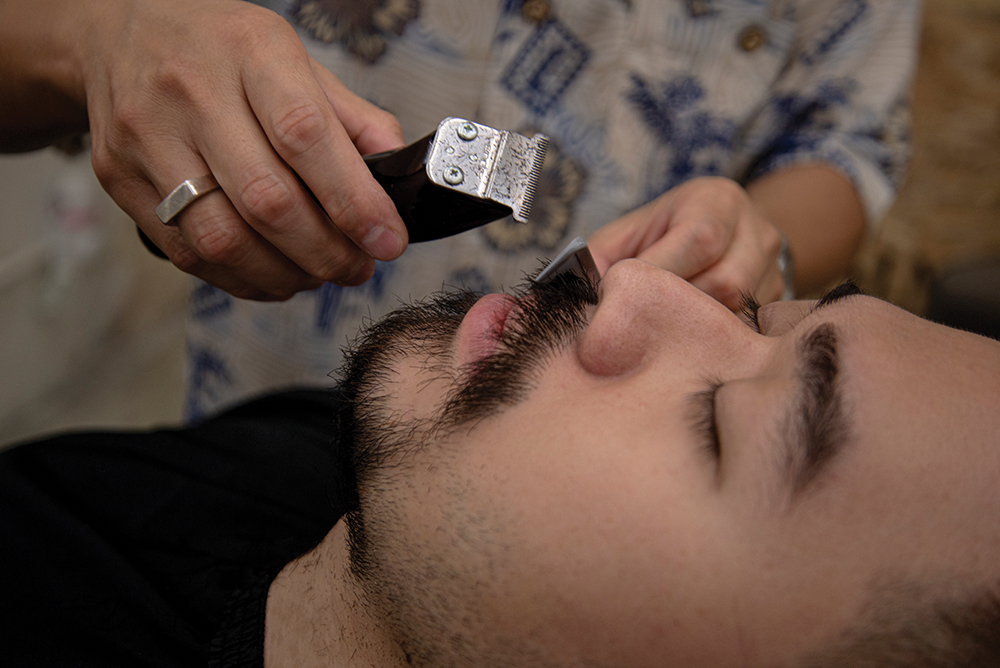November is men’s health awareness month, making it a good time to take a closer look at the idea of toxic masculinity, and how it negatively affects men’s health, both physically and mentally. Read on to find out how manning up is costing men their health.

Hongkonger Aaron Stadlin-Robbie had his first panic attack seven years ago, a moment he describes as overwhelmingly frightening and disorientating.
“I had never experienced anything like that before,” says Stadlin-Robbie. “It honestly felt like I was having a heart attack. It was terrifying.”

“At first, I had no idea what was going on. I tried to rush home and felt if I slept then it would go away. It didn’t work and I had another major panic attack at home.” Stadlin- Robbie was first misdiagnosed with a Vitamin B12 deficiency, and battled panic attacks for an entire year before he was properly diagnosed. The experience led him to launch Talking Mental, a podcast aimed at removing the stigma around mental health issues, particularly in men.
“The stigma exists for everyone, but I would definitely say more so for men,” says Stadlin- Robbie. “In my opinion, men like to feel in control. We always want to showcase that we are confident of the path we are taking […], and with mental health, it’s easy to feel you aren’t in control.”
Aaron’s perception that men struggle more than women to address health problems isn’t unusual – it’s actually a proven fact. A 2012 British survey found that men are much less likely to use primary care services regularly, with nearly nine out of 10 men stating they wouldn’t seek advice from a doctor or pharmacist unless they felt they had a “serious problem.” A similar study from the U.S. Department of Health and Human Services showed that men make fewer contacts with physicians across their lifespan compared to women, and were twice as likely to have gone two years or more without visiting a physician.
Researchers believe that the kinds of male cultural norms Stadlin-Robbie is referring to – a desire for control, stoicism, an aversion to vulnerability
– are caused by what’s commonly referred to as “toxic masculinity.” And while the term has made its way into the popular lexicon in recent times, what does it actually mean and how is it affecting men’s health?

What is, and isn’t, toxic masculinity?
Toxic masculinity is a term that’s used to describe the negative aspects of exaggerated masculine traits, such as a need for dominance, violent behaviour, hyper-competitiveness, and suppressing most emotions other than anger. While it might sound like an anti-male concept, the term was actually coined by men during the mythopoetic men’s movement, a New Age-style men’s self-help concept popular in the 80’s and 90’s.
The movement offered workshops and retreats to facilitate what they deemed a spiritual reawakening of the “deep masculine identity,” which was seen as separate from the “toxic masculine” traits of modern society, such as aggression and an inability to express emotions.
For better or worse, the term caught on, with everyone from women’s rights organisations to far right wing groups co-opting the idea for their own ideological gains. Razor company Gillette even released a commercial in 2019 calling out toxic masculine behaviour, a move that sharply divided its mostly male clientele, some of whom retaliated with a #BoycottGillette campaign.
Today, the term is frequently misunderstood to mean that male behaviour as a whole is problematic, when that’s far from reality. Modern sociologists have argued that traditionally masculine ideals like physical strength or sexual potency become maladaptive only when they set unattainable social standards for men and boys to live up to. Toxic masculinity isn’t an inherent flaw in all men; it’s more accurate to say that social environments cause toxic masculine behaviour by setting misguided and unrealistic expectations about what a male experience should be.

Masculinity and men’s health
Regardless of the fine print of what it does and does not mean, toxic masculinity does have undeniable implications for men’s health.
Men are more likely to suffer from preventable or treatable health problems, including mental health issues like depression. According to the American Psychological Association (APA), men are 3.5 times more likely than women to die by suicide, and their life expectancy is nearly five years shorter than women’s.
In 2019, the APA actually released its first ever guidelines on treating men and boys, citing startling statistics like male homicide and suicide rates, life expectancy, and risk of violent crime as a basis for the move.
The APA said the guidelines were aimed at helping practitioners with their male patients, contending with social forces that may affect their mental health. Advice included encouraging fathers to engage more with their children and steering men towards healthy behaviours.
The APA guidelines drew on more than 40 years of research, concluding that, “traditional masculinity is psychologically harmful and […] socializing boys to suppress their emotions causes damage that echoes both inwardly and outwardly.”
Robert Dunne, Hong Kong country manager for men’s cancer awareness campaign Movember, agrees that a reluctance to appear emotional may prevent men from seeking help. “Some men may have a tendency to hope that if they ignore issues, they might go away, or fix themselves,” says Dunne.

“Others may feel that they need to remain strong and look after the family. They may feel that asking for help is a sign of weakness, or when it comes to mental health, may feel that they will be judged.”
It’s one of the reasons why Movember, a grassroots advocacy movement that challenges men to grow moustaches during November, was launched in 2003: in order to raise awareness of prostate cancer, a subject few men at the time were willing to talk about publicly.
“It’s a fun way of getting men to talk about male health issues. People will ask men why they are growing a moustache, or why they’ve shaved off at the beginning of Movember; it’s a brilliant conversation starter.”

The moustache challenge grew into a global movement, and Dunne says Movember now targets a wide spectrum of men’s health issues, the most pressing of which he believes is mental health.
“Time has moved on and the pressures, challenges and environment have changed. As a society, issues around men’s mental health have become more prominent, particularly during current times.”
Catching men’s cancer early
A reluctance to talk about or take control of one’s health inevitably leads to negative outcomes, including heart disease, diabetes, and cancer, which are all leading causes of premature death in men.
Dr. Ho Yap-lin is a specialist urologist, who says that prostate cancer is one of the most common and easiest cancers to treat in men, yet is often difficult to catch early on due to a lack of awareness or willingness to
be tested.

“It is currently the third most common cancer in men,” says Dr. Ho. “There is also a rising trend recently, with new case incidence almost doubling in the last decade […], most noticeably in men under 65.”
Dr. Ho, who partners with the Hong Kong Movember campaign, says that because prostate cancer can be asymptomatic, early detection and diagnosis is crucial. The easiest and most essential screening method involves a blood test, and should be done by men who are experiencing urinary symptoms, such as urinating more frequently, as well as men over 50, or men over 45 with a family history of prostate cancer.
Overcoming toxic masculinity
Although it might seem like an uphill battle, awareness of the problem is key to finding solutions. That’s why groups like the APA and Movember are encouraging men to open up and discuss their feelings and concerns, reducing the risk of isolation and further health problems down the line.

“The more we talk about it, the more we break down the barriers,” says Dunne, who believes women are a vital ally to producing widespread change. “Each year, we also invite Mo Sisters to get involved [in the Movember campaign], as we acknowledge that women also play a significant role in encouraging their fathers, brothers, and partners to seek help for anything that is bothering them.”
The problem of toxic masculinity isn’t one that will be solved overnight. But through awareness, open conversations, and a commitment to changing the culture of dominant masculine ideals, healthier outcomes for men – and the families they belong to – are within reach.
Read more: The Best Hong Kong Barbershops for Men’s Grooming






